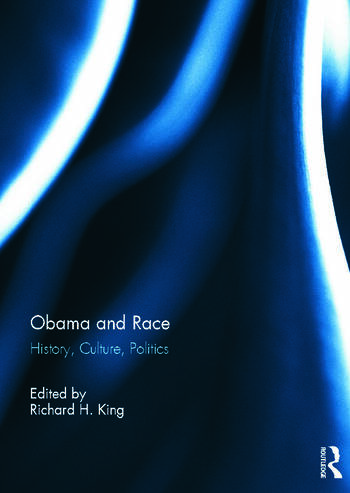Obama and Race: History, Culture, PoliticsPosted in Anthologies, Anthropology, Barack Obama, Books, History, Media Archive, Politics/Public Policy, Social Science, United States on 2012-07-17 04:20Z by Steven |
Obama and Race: History, Culture, Politics
Routledge
2011-11-10
200 pages
Hardback ISBN: 978-0-415-68678-5
Edited by
Richard H. King, Professor Emeritus of American and Canadian Studies
University of Nottingham
In this collection, academics from both sides of the Atlantic analyze the confluence of a politician, a process, and a problem—Barack Obama, the 2008 US presidential election, and the ‘problem’ of race in contemporary America. The special focus falls upon Barack Obama himself, who appears in many guises: as an individual from biracial and transnational backgrounds; a skilled, urban African-American organizer and then politician; and as intellectual and author of a bestselling autobiographical exploration.
There is a certain representative quality about Obama that makes him a convenient way into the labyrinth of American race relations, national and regional politics (including the South and Hawaii), and past history (particularly from the 1960s to the present). Contributors also explore the role Michelle Obama has played in this process, both separately from and together with her husband, while one theme running through many chapters concerns the myriad ways that the American left, right and centre differ on the nature and future of race in a country that daily becomes more mixed in ethnic and racial terms. Race is everywhere; race is nowhere. The essays are grouped by their approach to the topic of Obama and race: via historical analysis, cultural studies, political science and sociology, as well as pedagogy. The result is an exciting mix of perspectives on one of the most fascinating phenomena of our time.
This book was originally published as a special issue of the journal Patterns of Prejudice.
Contents
- Obama and race: culture, history, politics Richard H. King, University of Nottingham, UK
- The riddle of race Emily Bernard, University of Vermont, USA
- ‘A curious relationship’: Barack Obama, the 1960s and the election of 2008 Brian Ward, University of Manchester, UK
- Barack Hussein Obama: the use of history in the creation of an ‘American’ president George Lewis, University of Leicester, UK
- Becoming black, becoming president Richard H. King, University of Nottingham, UK
- Two great days in Harlem Carmel King, freelance photographer, UK
- How to read Michelle Obama Maria Lauret, Sussex University, UK
- Barack Obama and the American island of the colour blind Peter Kuryla, Belmont University, USA
- Barack Obama as the post-racial candidate for a post-racial America: perspectives from Asian America and Hawaii Jonathan Y. Okamura, University of Hawaii, USA
- Barack Obama and the South: demography as electoral opportunity Donald W. Beachler, Ithaca College, USA
- Teaching Obama: history, critical race theory and social work education Damon Freeman, University of Pennsylvania, USA
